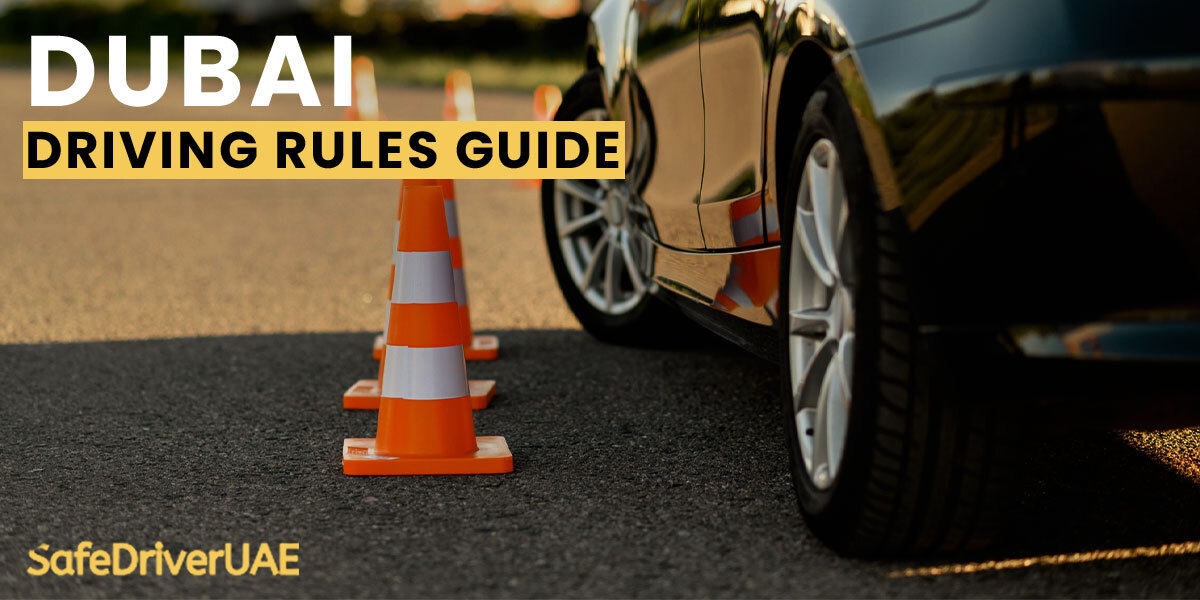Every driver in Dubai is required to abide by a specific set of laws and regulations when driving. For the protection and safety of other drivers on the road, it is imperative that you comprehend these driving laws, whether you are a local or a visitor.
The roads in Dubai are well-kept and effective, but in order to drive safely on them, you must be aware of the applicable traffic driving rules, road signs, speed restrictions, and driving customs. With the guidance of this comprehensive reference to driving regulations in Dubai, you will be able to drive safely and sensibly around this busy metropolis.
What is Dubai’s Most Important Driving Regulation?
Traffic Signals and Speed Limits: The most crucial driving rule in Dubai is to follow traffic signals and speed limits. Obeying traffic signals, especially red lights at intersections and tram crossings is vital to avoid heavy fines and ensure safety. Sticking to the posted speed limits helps prevent accidents and keeps traffic flowing smoothly.
Accidents and Reporting:
In Dubai, all accidents, no matter how small, must be reported to the police. If you’re not at fault, you’ll receive a green card, which is necessary for processing insurance claims.
Alcohol and Driving Laws:
Driving under the influence of alcohol is strictly prohibited in Dubai. The legal limit is zero, meaning any amount of alcohol in your system is illegal. Those caught will face severe penalties.
Liquor Laws in Dubai:
Non-Muslim residents can legally buy alcohol for home use and drink in licensed venues. Tourists can obtain a temporary one-month liquor license. However, it’s illegal to drink or be drunk in public, and the penalties are strict. The legal drinking age is 21 in Dubai and the rest of the UAE, except in Abu Dhabi, where it’s 18.
Car Cleanliness:
Keeping your car clean is important in Dubai, especially with frequent sandstorms. Dirty cars can result in fines up to Dh3000. It’s recommended to use professional car washes, as washing your car at home can lead to fines due to environmental concerns.
Seatbelt Rules:
Seatbelts are mandatory for everyone in the vehicle, whether you’re driving in the city or on the highway. This rule is strictly enforced to ensure the safety of all passengers.
Speed Limits:
Here’s a quick guide:
Freeways: 100-120 km/h, with a minimum of 60 km/h.
Urban areas: 60 km/h.
Residential areas: 40 km/h.
Exceeding these limits can result in heavy penalties.
Right of Way: Knowing the right of way rules is essential:
Crossing Points: Vehicles from the opposite side have the right of way.
Roundabouts: Yield to vehicles already in the roundabout before entering.
Give-Way Signs: At intersections with give-way signs, yield to vehicles on the cross street, especially those approaching from your right.
General Tips For Driving Safety in DUBAI
In addition to the guidelines mentioned above, bear the following driving advice in Dubai in mind.
Stay Calm and Patient: It’s easy to come across unpredictable drivers, but staying calm and avoiding rash behavior will help keep you safe.
Avoid Swearing or Offensive Gestures: Keep it cool on the road. Swearing or using offensive hand gestures isn’t just rude—it’s also against the law and could get you into trouble.
Use RTA Smart Drive: Download the RTA Smart Drive app to make navigating Dubai’s roads a breeze. It’s a handy tool for avoiding traffic and finding the best routes.
Buckle Up: Always wear your seatbelt. It’s not just about safety—if you’re caught without it, you could face a fine of AED 400 and get 4 black points on your license.
Drive with a Valid License: Never hit the road without a valid Dubai driving license, or the correct license for the emirate you’re in.
Don’t Use Your Phone While Driving: Stay focused on the road and avoid using your phone while driving. It’s safer for you and everyone else.
Register Your Car: Make sure your car is registered in Dubai before driving it. It’s a simple step to avoid any hassles on the road.

